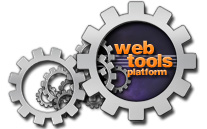Eclipse Web Tools Platform 1.5 - New and Noteworthy

Eclipse Web Tools Platform 1.5 - New and Noteworthy |  |
Web Services | |
| New look for Web services wizards |
The Web Service wizard and Web Service Client wizard have a new look. The first page of these wizards now combines the first three pages of the same wizards in WTP 1.0. On this first page of the wizard, the user can:
|
| Axis 1.3 support |
The Axis emitters and JARs used by the Web Services wizards are now based on Axis 1.3. |
| Axis emitter preference page |
A new Axis emitter preference has been added to control Axis emitter settings for Wsdl2Java and Java2Wsdl. This include setting timeout and analysing the service class for compliance to JAX-RPC.
|
| Skeleton merge |
A new checkbox is added to the Web services Resource preference to enable the user to turn on skeleton merge. When creating top-down Web service with this preference enabled, the newly generated skeleton implementation file will be merged with the existing implementation files if they exist. This enables the user to preserve user-modified code between different invocation of the Web Services wizards.
|
| Enhancements in Web Services Explorer |
When users click the Browse button in the WSDL page, they can now select different categories of WSDL documents to display:
Other enhancements in the Web Services Explorer include:
|
| Web Services Ant tasks |
Starting in WTP 1.0, users can create bottom-up Web service, top-down Web service and Web service client using Ant tasks. Refer to the Web Service Ant Tasks tutorial for instructions on how to use the Ant tasks. |
WSDL Editing Tools | |
| Simplified Design View |
For WTP 1.5, the Design View has been simplified. It has been restructured to de-emphasize Bindings and Messages and to emphasize Operations and Elements/Types.
De-Emphasizing Bindings
Binding information in the Design View has been reworked. They have been de-emphasized
because they are expert objects that many users maintain via the Binding generator.
By default, the Binding is collapsed and is seen as a single icon.
Users can expand them (by double clicking on them) and they will show up as a ruler next to it's associated PortType. See below:
To edit the Binding, users would click on the Binding object they wish to edit and a corresponding Property Sheet will appear. For example, if the user clicks on a Binding Operation, the Extensions Tab can be used to edit the detailed information for the Binding object. See the Extensions section below for more information. |
| Navigation |
The editor has hyperlink support in the source view. Hold down the Ctrl key and move the mouse pointer over some reference (ie. reference to some other PortType), and a link appears. If you mouse click on the link, context changes to that reference.
|
| Extensions |
You can provide specialized extension information to your WSDLs via the extensions tab of the Properties View. Use the 'Add..' button to choose from categories of available extensions. Then use the Tree View and the details view to edit the extension information.
|
| XML Schema Integration |
In WTP 1.0, XML Schema content was viewed and edited by 'drilling into' the schema object. The XML Schema Editor would then appear within the WSDL Editor. In WTP 1.5, the XML Schema Editor will no longer appear within the WSDL Editor. Instead, a separate XML Schema Editor will be opened on the desired XML Schema object. To launch the XML Schema Editor, the user clicks on the link icon which appears to the right hand side of each Input/Output/Fault Part. This link icon will only appear if the associated type is not a built-in XML Schema Type. See below:
A new external XML Schema Editor is shown below:
|
| Smart Editing |
In practise WSDL documents are authored using a number of different patterns (html :get and put, soap doc-literal, doc-literal wrapped, rpc-encoded etc.). When creating new content via the graphical view the WSDL editor (e.g. when adding an operation) will recognize the authoring pattern and create new content accordingly.
|
| Refactoring |
In WTP 1.5, there is inter-file refactoring in addition to pre-existing intra-file refactoring support. This means that if you rename a top level component such as a PortType, any references to it from other WSDLs in the current project or workspace will be updated. Inter-file refactoring can be done in two ways:
If the user simply renames a component without invoking an explicit refactoring the editor behaves just like it did in WTP 1.0. References to renamed components are updated only within the current wsdl file.
|